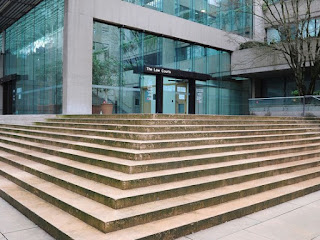Keith Fraser
Vancouver Sun
April 21, 2021
A charity representing the Jehovah’s Witnesses claims that a B.C. privacy law violates religious freedoms and is seeking to have the legislation struck down as unconstitutional.
The Watch Tower Bible and Tract Society of Canada, a charity that represents the Jehovah’s Witnesses Christian denomination in Canada, filed a lawsuit in B.C. Supreme Court after two former congregants lodged complaints with the Office of the Information and Privacy Commissioner for British Columbia.
A charity representing the Jehovah’s Witnesses claims that a B.C. privacy law violates religious freedoms and is seeking to have the legislation struck down as unconstitutional.
The Watch Tower Bible and Tract Society of Canada, a charity that represents the Jehovah’s Witnesses Christian denomination in Canada, filed a lawsuit in B.C. Supreme Court after two former congregants lodged complaints with the Office of the Information and Privacy Commissioner for British Columbia.
The former congregants, one in Grand Forks and one in Coldstream, had repudiated the Jehovah’s Witnesses and had contacted the privacy commissioner after the congregations in the small communities had denied them access to personal information.
When they had withdrawn as Jehovah’s Witnesses, the congregations had set up committees of three elders to provide the former congregants with any possible spiritual assistance and otherwise confirm their decisions to repudiate.
The committees each created a “confidential religious summary” of the matters and securely stored them in the local Kingdom Hall used by the congregations. The congregations refused to release the documents to the former congregants.
In the case of one former congregant, the privacy commissioner appointed an investigator and in January a decision was made to proceed to an inquiry, although the inquiry has not yet commenced.
In the other case, an investigator has not yet been appointed, but a lawyer for the charity said in an interview Tuesday that there should be no inquiries in either case.
“Our position is we shouldn’t go there,” said Jayden MacEwan. “This is really the government interfering with religious practice.
“The big issue is the law itself is unconstitutional because there’s absolutely no exemption for religious practice, for religious ministers, for non-profit religious organizations that are not doing any type of commercial activity.”
The Personal Information Protection Act, which received assent in 2003, requires private sector organizations in B.C. to follow certain rules to protect the privacy rights of individuals in the process of collecting, using, holding or disclosing personal information.
The law gives an individual a right to request access to their personal information in the possession of an organization and aims to balance the rights of those individuals with the reasonable needs of the organization.
MacEwan said it’s the position of the Jehovah’s Witnesses that the documents being sought are the religious minister’s personal information.
“These are the personal notes that have to do with spiritual, pastoral care that they offer congregants. We’re talking about certain types of confidential communications and notes. That’s what we’re dealing with here.”
He said that what really stands out is there are some exemptions in the law that protect the charter rights of journalists, artists and writers but nothing that protects religious rights.
The attorney-general’s ministry said in an email that it has received the lawsuit and is considering its response.
kfraser@postmedia.com
twitter.com/keithrfraser
https://vancouversun.com/news/local-news/jehovahs-witnesses-challenge-constitutionality-of-b-c-privacy-law
When they had withdrawn as Jehovah’s Witnesses, the congregations had set up committees of three elders to provide the former congregants with any possible spiritual assistance and otherwise confirm their decisions to repudiate.
The committees each created a “confidential religious summary” of the matters and securely stored them in the local Kingdom Hall used by the congregations. The congregations refused to release the documents to the former congregants.
In the case of one former congregant, the privacy commissioner appointed an investigator and in January a decision was made to proceed to an inquiry, although the inquiry has not yet commenced.
In the other case, an investigator has not yet been appointed, but a lawyer for the charity said in an interview Tuesday that there should be no inquiries in either case.
“Our position is we shouldn’t go there,” said Jayden MacEwan. “This is really the government interfering with religious practice.
“The big issue is the law itself is unconstitutional because there’s absolutely no exemption for religious practice, for religious ministers, for non-profit religious organizations that are not doing any type of commercial activity.”
The Personal Information Protection Act, which received assent in 2003, requires private sector organizations in B.C. to follow certain rules to protect the privacy rights of individuals in the process of collecting, using, holding or disclosing personal information.
The law gives an individual a right to request access to their personal information in the possession of an organization and aims to balance the rights of those individuals with the reasonable needs of the organization.
MacEwan said it’s the position of the Jehovah’s Witnesses that the documents being sought are the religious minister’s personal information.
“These are the personal notes that have to do with spiritual, pastoral care that they offer congregants. We’re talking about certain types of confidential communications and notes. That’s what we’re dealing with here.”
He said that what really stands out is there are some exemptions in the law that protect the charter rights of journalists, artists and writers but nothing that protects religious rights.
The attorney-general’s ministry said in an email that it has received the lawsuit and is considering its response.
kfraser@postmedia.com
twitter.com/keithrfraser
https://vancouversun.com/news/local-news/jehovahs-witnesses-challenge-constitutionality-of-b-c-privacy-law


1 comment:
Great reporting. Thanks for sharing. The Watchtower organization should become more transparent. But that is part of the Control they have over their congregants.
Post a Comment